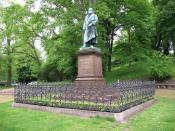Carl Friedrich Gauss
Carl Friedrich Gauss was one the great mathematicians of modern time. His work in
the areas of statistics, probability, astronomy and geodesy, among other fields, established
basic principles in the scientific world without the benefits of modern technology.
Gauss was recognized as a prodigy at an early age. He had taught himself reading and
arithmetic by the age of three. It has been written that at this age Gauss pointed out a
figuring error his father had made. At the age of 10, he was permitted to attend an
arithmetic class where his genius was recognized and nurtured by a teacher named
Buttner. When Gauss had learned everything Buttner had to offer, Gauss was
recommended to the Duke of Brunswick, who offered him a stipend that allowed him to
further his education. This enabled Gauss to continue his education in secondary school
and the University of Gottingen.
Gauss left Gottingen in 1798 without a diploma, but by this time he had made his first
major contribution to the world of mathematics. He had discovered how to construct a 17
sided polygon using only a ruler and compass. This was the most major advance in the
field in two millenium.
His next few years were very productive and his ideas came to him more quickly than
he could record. He received his doctorate from the University of Helmstedt in 1799 by
giving a dissertation that gave the first proof of the fundamental theorem of algebra.
In 1801, Gauss had two major achievements. The first was the publication of his
Disquisitiones arithmeticae (Examinations of Arithmatic), which included his discovery of
the 17 sided polygon along with his other works of the past four years. His second major
achievement involved the discovery of the asteroid Ceres. The asteroid had...


